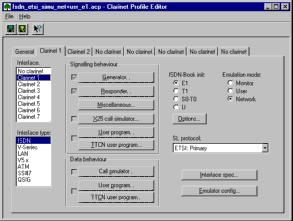|
|
|
Clarinet ISDN application
Presentation
The Clarinet-system is a powerful Protocol Test
Platform supporting ISDN interfaces and protocols. It offers a wide
variety of functions:
- Monitoring
- Automatic simulation
- Conformance testing for different layers of protocols based on
ETSI or NIUF test suites
|

Large snapshot
|
ISDN
|
Monitor |
Emulation |
Executable
Test Suites |
C-Programs
Simulation |
Built-in
Simulation |
| Q921 |
x |
x |
ETS 300 402_7 |
x |
x |
| Q931-Basic Call |
x |
x |
ETS 300 403_5 |
x |
x |
| Supp Services |
x |
x |
x |
x |
see
details |
|
| The flexibility and the user-friendly
interface of the software provides the user with a way to use it for
product development, engineering or field trials. |
Standard Features
Interface connection
Analysis Functions
Emulation functions
Signaling simulation
Programmable simulation
Conformance testing simulation
Clarinet-system: basic configuration
Interface Under Test
- E1 75 or 120 Ohms
- T1 75 or 100 Ohms
- S-T Bus I431
- U 2B1Q
Operating Interface
- Transdata
- Handset
- Transit
Interface Management
- Up to 7 simultaneous interfaces
- Simultaneous management on each interface
of three types of PH, SL, DL links:
- PH-physical interface: U, S-T, E1 or T1 selection.
- Signaling link: definition of
the signaling channel (T1 or E1) for D channel.
- Data link: automatic
B channel of BOP, BERT or BYTE-TS
type.
Protocol Event Generation
- Time-stamping at 0.1ms
- Physical level: U and S-T states (infos I430), E1
and T1 alarms.
- Signaling link: D channel HDLC frames.
- Data link: HDLC frames, BERT-G821 results
or BYTE-TS blocks.
- DTMF code.
Statistics Event Generation
- Sampling at a user specified value (in sec)
- BOP type event counters on SL or DL.
- Data-flow counters on BOP link at
different protocol layers.
Protocol Specification for Display
- Physical Link: E1 TS0, T1, I430, G861
- Signaling Link:
- Data structure: BOP envelope, SS7.
- Decoding according to a protocol stack with 7 decoding
levels
- Data Link:
- Data structure: BOP envelope, SS7, BERT,
BYTE-TS.
- Decoding according to a protocol stack with 7 decoding
levels
- Event-Editor Functions for events, formatting,
and filtering
Q931 Automatic Simulation:
Behavior: Generator (1 to 32 outgoing SETUP's) and/or
responder (acceptance, 30 incoming SETUP’s).
- Independent outgoing communications
defined by:
- delays and IE buffer for SETUP, INFOS, RELEASE.
- number of repetitions and
inter-communications delay.
- B channel establish and active
source.
- Identical incoming communications defined
by:
- ACCEPT/REJECT behaviour.
- Transmission option and IE buffer
for SETUPACK, CALL-PROC, RELEASE.
- Delay before CONNECT.
- Establish and active source of
the B channel: default or
indication by USER INFO.
- Manual commands: CALL, CLEAR, INFO,
RESTART, etc..., DTMF values.
- Outgoing communications triggered by:
- Starting delay.
- Manual commands.
- Incoming communications (for 15
outgoing communications).
- Call simulator data sources:
- BOP Mode DL: X25 call simulator,
user program.
- DL Mode BERT: Pattern: 29 - 1
(V52), 211 - 1 (O152), 215 - 1
(O151), results according to
CCITT G821.
- DL Mode BYTE-TS.
- LOOP.
- External TRANSIT or TRANSDATA
links.
- COFIDEC 1 and 2 internal links on
analog sources: DTMF 1 and 2, HANDSET...
Physical Layer
- Emulation mode: BRI / PRI, NT
(Network) or TE (User).
Link Layer: Q921
- SAPI 0,16 and 63 initialization
- Setting of Parameters (time-limits, numbering)
Network layer: Q931
- Selection of national variants (ETSI, NI2,ATT...)
- Setting of Parameters (time-limits, numbering...)
X25 Automatic Simulation:
- X25 automatic simulator can be run
in:
Frame Relay automatic simulation:
- Frame Relay automatic simulator
can be run in B channel
IP automatic simulation:
- IP/TCP/H323 automatic simulator
can be run in B channel
API
- Use of CLARINET-Development C language
- Microsoft format library.
- Level N simulation using emulation on signalling channel.
ETS
- Use of ETS packages resulting from TTCN compilation:
- ISDN Basic call and Supplementary services Network side
- ISDN Basic call and Supplementary services User side
- ISDN TBRs
- Template of profiles, PICS/PIXIT
- Execution under Clarinet Run-time
ATS
- The Clarinet TTCN compiler and the stack of emulators allow the users to develop
or customize new ETS.
Qty
|
Refer.
|
Product Designation
|
1
|
2001
2002
|
Clarinet-Book USB E1/T1
Clarinet-Book USB U/S-T
|
1
|
8001
|
Clarinet-Run-time
|
Clarinet-system: ISDN options
Qty
|
Refer.
|
Product Designation
|
1
|
8691
|
Clarinet-ETS-300 402_7 ISDN Data Link Layer
|
1
|
8770
|
Clarinet-ETS-300 403_5 ISDN Basic Call User side
|
1
|
8692
|
Clarinet-ETS-300 403_7 ISDN Basic Call Network side
|
|
